NSYSU organizes Interdisciplinary Forum for Transportation Equity in Rural Areas
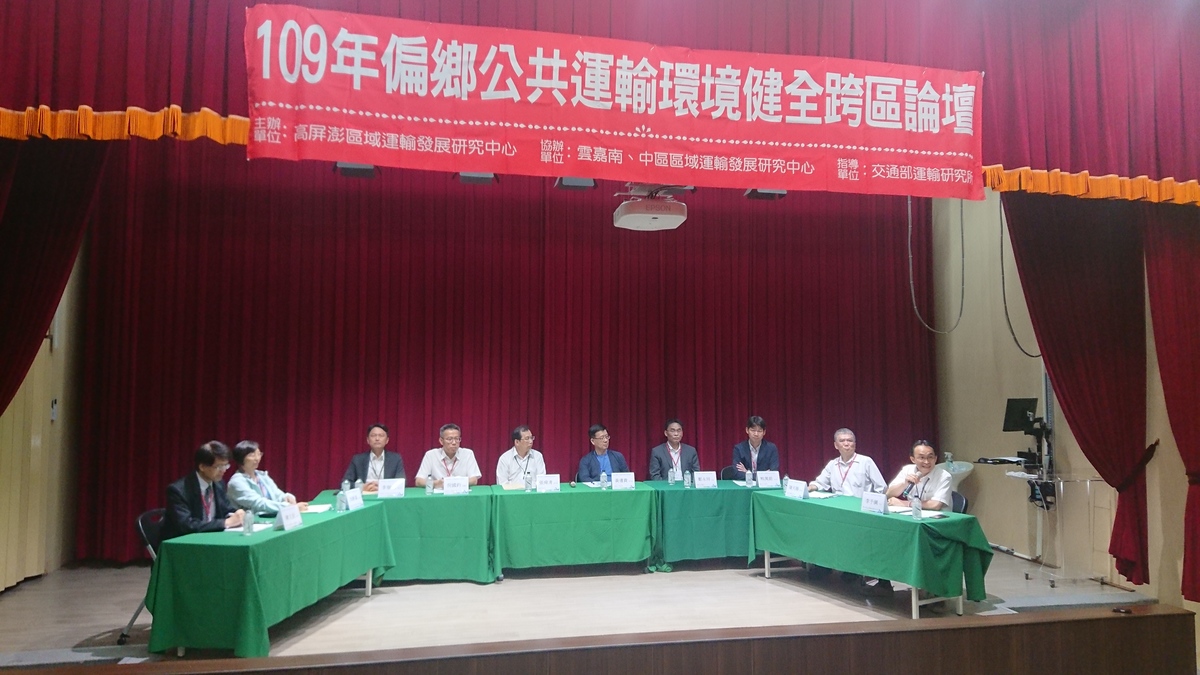
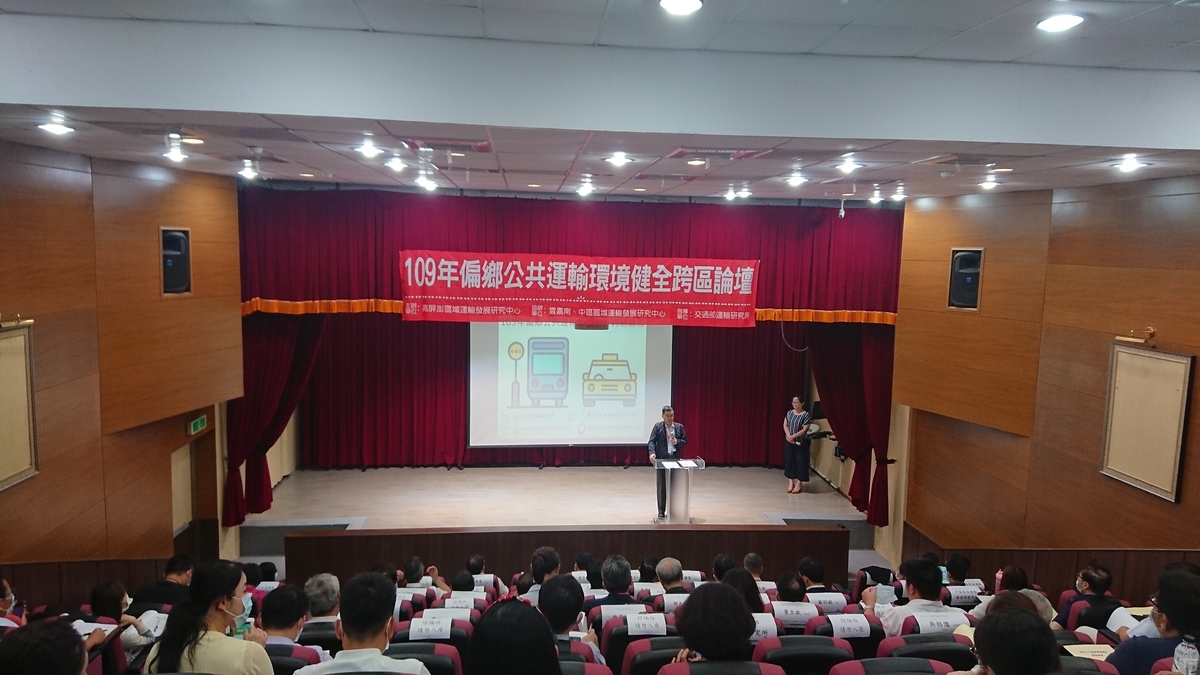
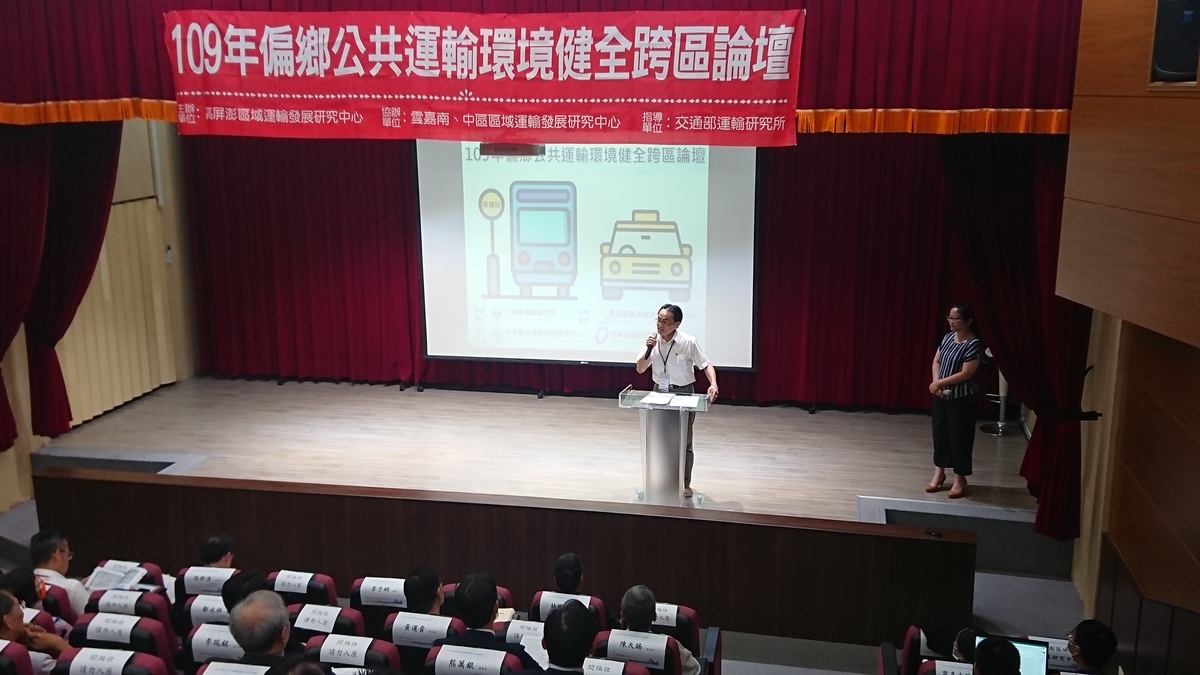
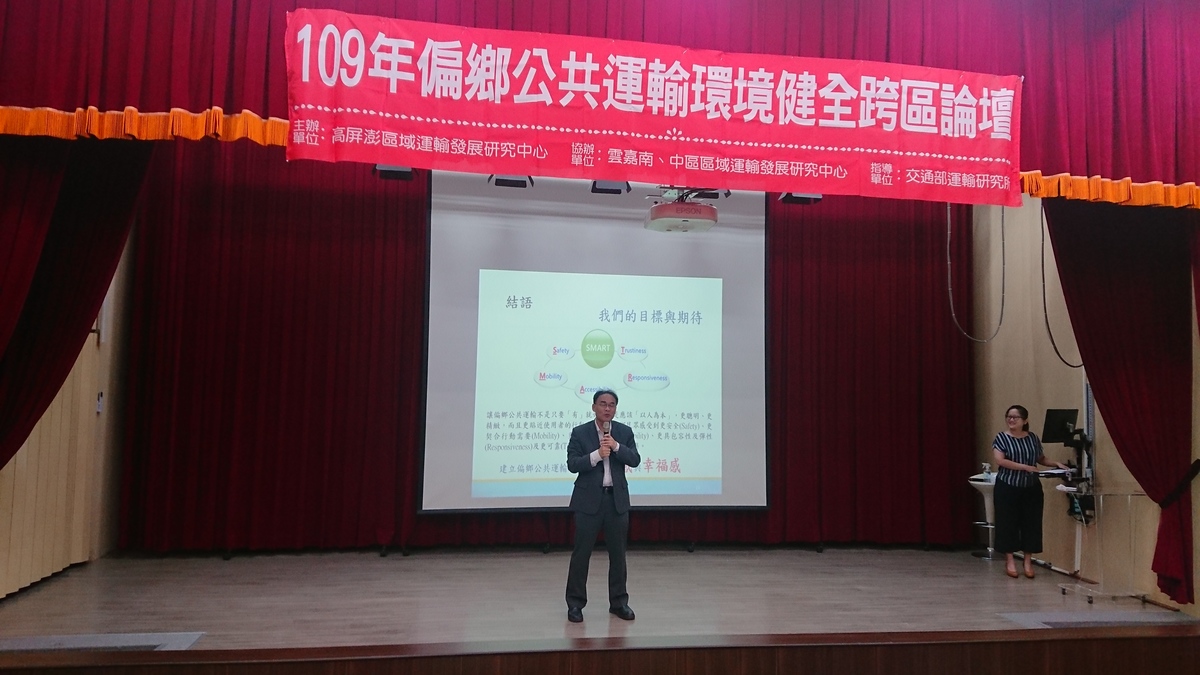
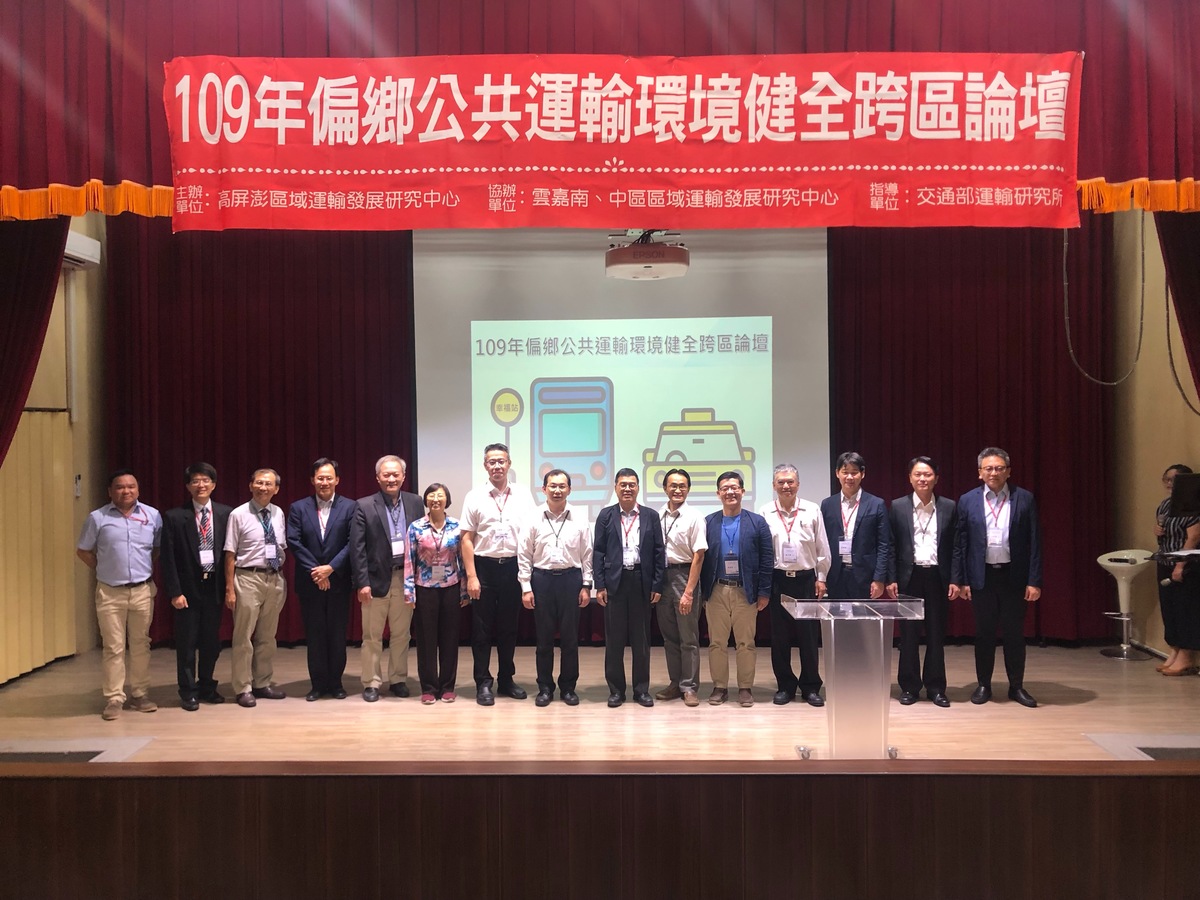
(Provided by the College of Social Sciences) For the transportation equity in rural areas and integration of resources in the society, the Kaohsiung, Pingtung, and Penghu Regional Transportation Development Research Center (KPPRTDRC) at National Sun Yat-sen University and the co-learning group for Smart City and Mobility jointly organized the Interdisciplinary Forum for Transportation Equity in Rural Areas, inviting representatives of transportation development research centers in Central and South Taiwan to discuss related issues, share the experience and challenges faced when striving for transportation equity in various areas. Representatives of transport-related government agencies participated in the Forum as well, hoping to combine the capacity of the academia, industry, and the government, and provide suggestions about policies related to transportation in rural areas for the government.
The KPPRTDRC has been devoted to transport governance in rural areas for many years. The Center Director Professor Yu-Kang Lee delivered a speech on the problems, challenges, and development policies related to rural transportation in Taiwan. He also said that to solve the transportation problems in indigenous villages, the voices of the local residents should be heard to draw a policy which is consistent with the needs of the residents; only then the resources can be effectively used. Regarding the balanced use of resources, he advised to not rely solely on the funding of public sectors but to encourage private companies and non-profit organizations to invest in basic transportation services through an inter-ministerial reward system. Only a multi-sided collaboration can allow financially sustainable development of transportation in rural areas.
Director Chi-Kuo Lin of the Institute of Transportation, Ministry of Transportation and Communications (MOTC), said that in a democratic country, citizens’ participation is an important instrument of social advancement. Efforts can be saved and better results can be obtained if the citizens take the initiative to promote the development of transportation and are assisted by the government. Director Chi-Kuo Lin also expressed his full acknowledgment for the efforts made by KPPRTDRC in rural public transportation services in recent years and he hopes that the Center will continue to make important contributions in the future.
Former Director-General of the Transportation Bureau of Kaohsiung City Government Yung-Hsiang Cheng enumerated three key factors for a good transportation environment that would fulfill residents’ needs, be financially sustainable, properly managed, and supervised. Thanks to the frontline participation of township mayor and secretary-general, the needs of the community were identified. After the policy was implemented, rolling adjustments were made to meet the key performance indicators of the government. At the same time, this could improve the community’s acknowledgment of the government. Deputy Director-General Yun-Kui Huang of the Directorate General of Highways, MOTC, emphasized the importance of inter-ministerial cooperation and said that the project promoting public transportation improvement in indigenous villages was not only carried out by the MOTC but also involved the Long-term Care Plan 2.0 of the Ministry of Health and Welfare and Culture and Health Stations under the administration of the Council of Indigenous Peoples. In addition, more efficient management of the means of transportation already operating is the focus of the policies on transportation both in Taiwan and abroad. Shun-Ching Chang, the Deputy Director of the Department of Railways and Highways of the Ministry of Transportation and Communications, said that although there was no special law passed concerning the Happiness Bus, it was possible to adapt the already existing management regulations to respond to the changing needs of the residents, for example, by relaxing the operation standards of the passenger transportation industry and other innovative practices, which can be tested and adjusted to the needs of rural areas.
Chia-Hsin Chen, a third-year student of the Department of Political Economy participating in the Forum, mentioned that the resources in the South of Taiwan are relatively scarce in comparison with the North and said that he is happy to see the industry, academia, and government agencies working together to solve the problem of insufficient rural transportation services. Huan-Chen Lin, a first-year student of the Institute of China and Asia-Pacific Studies said that the College of Social Sciences at NSYSU has recently established a co-learning group for smart city and transport, which broadened his horizons and study scope and provided diverse course options.
Participants of the Forum included the Deputy Director of the Transportation Research Institute of the Ministry of Transport Tien-Tze Chen, Deputy Director of the Kaohsiung Motor Vehicle Office Ruey-Ming Li, Director Ta-Yin Hu of the Yunlin and Chiayi Regional Transportation Development Research Center, and Deputy Director of the Central Regional Transportation Development Research Center Jau-Ming Su, who provided valuable suggestions for the public transportation arrangements in rural areas, reached a consensus on strengthening cooperation in the future and would continue to pay close attention to the development of rural public transportation.
(Edited by Public Affairs Division)
The KPPRTDRC has been devoted to transport governance in rural areas for many years. The Center Director Professor Yu-Kang Lee delivered a speech on the problems, challenges, and development policies related to rural transportation in Taiwan. He also said that to solve the transportation problems in indigenous villages, the voices of the local residents should be heard to draw a policy which is consistent with the needs of the residents; only then the resources can be effectively used. Regarding the balanced use of resources, he advised to not rely solely on the funding of public sectors but to encourage private companies and non-profit organizations to invest in basic transportation services through an inter-ministerial reward system. Only a multi-sided collaboration can allow financially sustainable development of transportation in rural areas.
Director Chi-Kuo Lin of the Institute of Transportation, Ministry of Transportation and Communications (MOTC), said that in a democratic country, citizens’ participation is an important instrument of social advancement. Efforts can be saved and better results can be obtained if the citizens take the initiative to promote the development of transportation and are assisted by the government. Director Chi-Kuo Lin also expressed his full acknowledgment for the efforts made by KPPRTDRC in rural public transportation services in recent years and he hopes that the Center will continue to make important contributions in the future.
Former Director-General of the Transportation Bureau of Kaohsiung City Government Yung-Hsiang Cheng enumerated three key factors for a good transportation environment that would fulfill residents’ needs, be financially sustainable, properly managed, and supervised. Thanks to the frontline participation of township mayor and secretary-general, the needs of the community were identified. After the policy was implemented, rolling adjustments were made to meet the key performance indicators of the government. At the same time, this could improve the community’s acknowledgment of the government. Deputy Director-General Yun-Kui Huang of the Directorate General of Highways, MOTC, emphasized the importance of inter-ministerial cooperation and said that the project promoting public transportation improvement in indigenous villages was not only carried out by the MOTC but also involved the Long-term Care Plan 2.0 of the Ministry of Health and Welfare and Culture and Health Stations under the administration of the Council of Indigenous Peoples. In addition, more efficient management of the means of transportation already operating is the focus of the policies on transportation both in Taiwan and abroad. Shun-Ching Chang, the Deputy Director of the Department of Railways and Highways of the Ministry of Transportation and Communications, said that although there was no special law passed concerning the Happiness Bus, it was possible to adapt the already existing management regulations to respond to the changing needs of the residents, for example, by relaxing the operation standards of the passenger transportation industry and other innovative practices, which can be tested and adjusted to the needs of rural areas.
Chia-Hsin Chen, a third-year student of the Department of Political Economy participating in the Forum, mentioned that the resources in the South of Taiwan are relatively scarce in comparison with the North and said that he is happy to see the industry, academia, and government agencies working together to solve the problem of insufficient rural transportation services. Huan-Chen Lin, a first-year student of the Institute of China and Asia-Pacific Studies said that the College of Social Sciences at NSYSU has recently established a co-learning group for smart city and transport, which broadened his horizons and study scope and provided diverse course options.
Participants of the Forum included the Deputy Director of the Transportation Research Institute of the Ministry of Transport Tien-Tze Chen, Deputy Director of the Kaohsiung Motor Vehicle Office Ruey-Ming Li, Director Ta-Yin Hu of the Yunlin and Chiayi Regional Transportation Development Research Center, and Deputy Director of the Central Regional Transportation Development Research Center Jau-Ming Su, who provided valuable suggestions for the public transportation arrangements in rural areas, reached a consensus on strengthening cooperation in the future and would continue to pay close attention to the development of rural public transportation.
(Edited by Public Affairs Division)
Click Num:
Share
